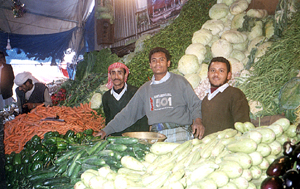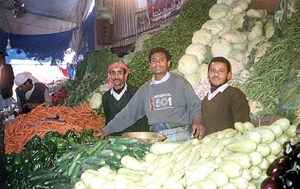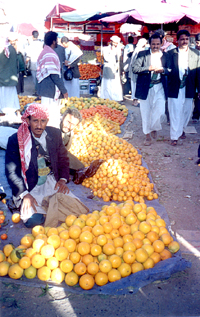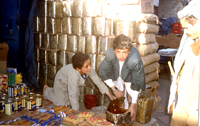
Ramadan in Yemen: Market Boost & Income Increase [Archives:2000/50/Business & Economy]
December 11 2000

Markets in main Yemeni cities have begun witnessing a tangible vitality just a week before the beginning of the fasting month of Ramadan, noticeably following a somewhat stagnation, particularly in the activities of the retail market dealing with foodstuffs, spices and sweets. Popular restaurants witness vibrant activity in serving meals to fasting people. Unemployed people cling to jobs that make them earn more money. Therefore, those people call the month of Ramadan as holy and generous for it enables them to provide for their families with income for days to come.
YT made a tour of the markets of Sanaa and came out with this report. Retailers said that the most saleable goods during Ramadan are spices such as cumin, pepper, thyme, cinnamon and saffron that are used in preparing meals for fasting people.
Spices: Most Salable Goods
Malek Al-Hamdani, a retailer, said that his rate of spices selling rose to 35%, higher than the period before Ramadan. This is because those spices are used in preparing heavy and light meals, desserts and in cooking meat.
Consumption of Dates
Mahdi Al-Mahjari, a seller of dates, said, Consumers prefer buying dates imported from Saudi Arabia for their high quality and competitive prices compared to dates locally produced in Tehama and Hadramaut. He added that his sales of dates increased by 65% specially because most fasting people consider dates as a main meal for beginning their Iftar (fast breaking) which provides them with energy and nutrition.
Merchants said that production of dates in Yemen is insufficient to cover local demand. The volume of local dates production is 427 thousand tons a year. However, merchants import about 180 thousand tons to cover the local demand. According to retailers, sales of sugar, Yemeni coffee, beans, peas, canned juice, powdered milk increased by 45% at the beginning of Ramadan. This is higher than sales in other months. Retailers profits increase and local markets revive.

Goods on show decrease as the volume of demand of consumers rises. Although local producers redouble their manufactured products and foodstuffs, prices still go up. This affects the purchasing power of limited-income people.
Ahmad Al-Odaini, a consumer, said that his salary, about $100 a month, is insufficient for buying Ramadan requirements all at once. He buys some foodstuffs basic for Iftar, dinner and Sahour meals. He does not buy meat or fruits.
Amin Hizam Al-Huhali, a consumer, said that some limited-income families resort to borrowing to cover expenses and the high prices of foodstuffs needed for Ramadan which is a season for more profit to merchants.
A visitor to the fruits and vegetable market in Al-Hasaba Center, Sanaa, in the afternoons of Ramadan will witness crowds of people buying locally produced vegetables. Unemployed people also become active in Ramadan and work in different jobs like selling Samosa which is made from flour paste with minced meat, eggs or cooked vegetables. They sell Samosa to fasting people.

Lahooh Industry increases Family Income
Income of families, making some kind of bread called Lahooh, increase in Ramadan. Women make large quantities of Lahooh which is made from flour, corn or sorghum mixed with honey, soup, ghee or milk to be served for the fasting people.
Fatima Al-Matary, a Lahooh seller in Bab Al-Yemen, said that she prepares about 200 to 250 pieces of bread every day during Ramadan and sells each piece for 20 rials. This allows her to make much money for days to come.
This bristling economic activity is not confined to poor families or jobless people alone. Restaurants in main cities witness a similar activity. They prepare Iftar and dinner meals for people who come to Sanaa from other cities. They prepare different kinds of food that can go well with food habits in different areas of Yemen so that customers feel as if they are at home. As a result, restaurant-owners gain much money during this month.
To sum up, we realized, after this tour of the markets of Sanaa, that Ramadan is a month for worshipping God, boosting local markets and offering job opportunities for unemployed people among whom are women who become active in selling different kinds of bread like Lahooh. This allows them to save money for the rainy days.
——
[archive-e:50-v:2000-y:2000-d:2000-12-11-p:./2000/iss50/b&e.htm]


